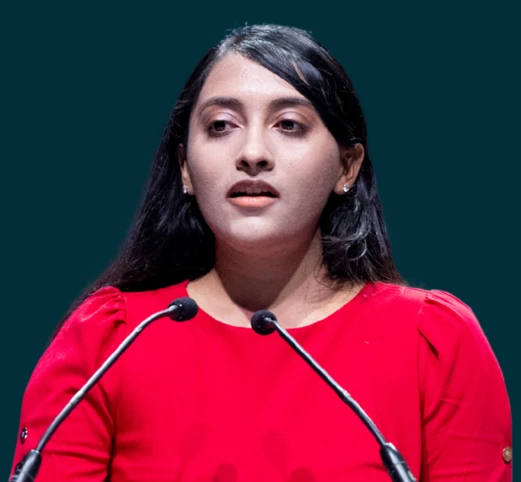In 2024 periods are still stigmatised in India. We spoke to Swara Patel, Founder of The Period Society, to find out why, and how she’s changing this.
1.8 billion people globally menstruate every month, yet in some cultures, the act is considered ‘dirty’ or ‘impure’.
“My family could barely discuss the topic when I got my first period,” admits Swara Patel, period poverty advocate and Founder of The Period Society.
“Some of my friends are asked not to enter the kitchen while menstruating. I know neighbours who isolate themselves during their period and I would pass food through their door.”
The negative connotations surrounding menstruation are often cemented in centuries-old beliefs, rather than biological facts, but this does not make them any less damaging. The stigma surrounding menstruation leads to girls and women feeling shameful about their periods, preventing honest discussions about women’s health from being had and halting the charge to achieving SDG 5: achieve gender equality and empower all women and girls.
The Period Society vs the menstrual taboo
Swara founded The Period Society in 2019 at the age of 16 because she had experienced and seen the damage that the stigma surrounding menstruation can have on women and girls. The Period Society is a nonprofit organisation promoting menstrual equity and eradicating period poverty throughout India and the world by combating the taboo surrounding menstrual, sexual and reproductive health.
“The Period Society trains youth in rural India to lead educational sessions with OB/GYN vetted modules,” Swara explains, “to date, we have educated over 50,000 individuals worldwide, distributed eco-friendly period products to more than 40,000 menstruators in India, and replaced 700,000 plastic pads with sustainable alternatives.”

What is the role of education in eliminating menstruation taboo?
A recent study by UNICEF and the World Health Organisation (WHO) found that globally only 39% of schools provide menstrual health education leading to millions of girls being unaware and unprepared for their first period.
“Education can empower people with the information to gain agency over their own health,” says Swara, “it is essential when it comes to achieving period equity because access to care is often limited by access to information.”
Menstruating can be a scary, often painful, time for girls and women, especially if they have not been adequately educated on what it is, why it occurs, and what to expect from it. In fact, a 2016 study involving just under 100,000 adolescent girls from India found that almost 50,000 of them did not know about menstruation until the first time they got their period and many of them even thought that they were dying or had caught a horrible disease the first time they menstruated due to the pain and blood.
“Many of the women we interact with through The Period Society do not have information about the biology of periods and fail to seek care for chronic or severe period pain, PCOS, and other related disorders,” explains Swara.
The lack of education on the biology of menstruation, coupled with the taboo surrounding the topic only amplifies the shame girls and women feel when they menstruate, creating a society where period poverty prevails.
“Period poverty and menstrual taboos shape behaviours and practices which jeopardise one’s health since menstruators globally cannot access period products and also sequester themselves in period huts in cultures when menstrual blood is conceived as impure,” says Swara.
Preventing misinformation
The taboo surrounding menstruation in India leaves girls and women feeling isolated and shamed, but the stigma is rooted in misinformation rather than biological facts. There is no scientific evidence that suggests that menstrual blood is impure, or that girls and women need to be segregated whilst on their period. Menstruation is a natural process and should not be used as a weapon of shame. But how can we stop the spread of misinformation?
“The best way to combat misinformation is by ensuring that people have access to adequate information. This can be implemented first and foremost by mandating medically verified and evidence-based sex education in educational institutions,” says Swara.
This sentiment is felt among the young people of India as a study found that 88% of young people think that sex education should start in primary school. That being said, 66% believe that teachers at a primary and secondary school level are not equipped with the knowledge and skills to teach sex education. How do we ensure our educators have the factual information they need to stop the spread of misinformation?
“It is essential that voices of public health experts and qualified healthcare professionals are amplified,” Swara explains, “they disseminate evidence-based and medically verified information to combat the spread of misinformation.”
Swara’s tips for eliminating menstruation stigma
We must all play our part in eliminating the menstruation taboo. Here are three ways that you can start:
- Take women’s pain seriously - dysmenorrhea or other pain that women experience due to a range of conditions is frequently dismissed and there is a vast disparity in the prescriptions of pain medications for men versus women. Women’s pain has historically been dismissed as hysteria and it is important for women to be able to advocate for themselves and have their concerns taken seriously by their providers.
- Improve access to preventative care for women - reproductive healthcare is more than pregnancy and women must have access to comprehensive healthcare. Women should be able to routinely access pap smears, HPV vaccines, and mammograms and be educated about the menstrual cycle to ensure that they are able to participate completely in society without being limited by a normal biological process.
- Access to information is a must - Mandate sex education in the K-12 curriculum and beyond to ensure that everyone is equipped with the information to lead healthy lives, form healthy relationships, advocate for themselves and monitor their health while consulting qualified healthcare professionals to the best extent possible.
Find out more about the Period Society via their website
Follow the work of the Period Society on Instagram
Author

